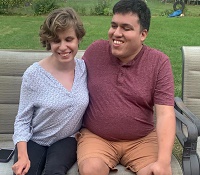Love is Blind: Part Three of a Series About Long-Distance Relationships during COVID 19
by Alicia
 In Part Two of Alicia Krage’s four-part series about long-distance relationships during COVID, she told readers how assistive technology played a role in growing their casual friendship into something bigger. Today, she describes how their bond continued to progress.
In Part Two of Alicia Krage’s four-part series about long-distance relationships during COVID, she told readers how assistive technology played a role in growing their casual friendship into something bigger. Today, she describes how their bond continued to progress.
The week that Juan had to cancel his trip to Chicago was tough. My mindset that entire week centered on “he was supposed to be here.” However, the two of us managed to keep ourselves occupied.with phone calls!
One thing I loved about our conversations (and still love to this day) is that they get very in-depth very quickly. I distracted myself from life in quarantine by focusing on his life in Texas instead. I asked him what he’s been doing, where he’s been. He said he was being cautious, and wasn’t going out a whole lot. We have some very deep conversations about blindness, too.
Not the topic of blindness itself, but our lives as blind people.
We talked about what it’s like to date as a blind person (I’m the first totally blind person Juan has ever dated). And when we were discussing getting out of the house, blindness did come up. “When you do go out, will Uber drivers still get out of the car and help you to the vehicle?” I asked. He said yes. Some other things we talked about:
- Traveling. Where would we love to travel one day? We have big
dreams! We wondered how COVID might affect travel. How much assistance can we count on — or not count on — at an airport now? - Assistive Technology. We compared notes on accessible certain
platforms and web sites are. - Our parents. His parents remind me so much of my own.
- Growing up. We swapped childhood stories.
Through all that, because of COVID, we knew we couldn’t visit each other in person. We kept in close contact by texting pretty regularly and making looooong phone calls instead. But were we dating?
That question was answered on a memorable day in May – Juan’s dad’s birthday, actually. Juan called me when he found out his brother would be coming in from Fort Hood Army Base in Killeen, Texas to Houston that day to surprise their dad. He wondered if it’d be okay to call when his brother arrived so he could introduce the two of us over the phone.
Then a silence stretched between us as we wordlessly recognized this silly little dilemma: what is he supposed to say? As if reading my mind, Juan nervously asked, “How do I introduce you?”
“What do you mean?” I asked, even though I kind of knew what he was getting at.
“Like, do I…do I introduce you as my girlfriend?”
“Sure!” I exclaimed. “You can do that.”
The words flew out of my mouth before I realized what I had just agreed to. He laughed, sounded a bit confused, and I explained my answer. “I appreciate you wanting to meet my parents before we make it official and everything, I really do, but we don’t know how long this pandemic is going to last and it kind of somehow already feels like we’re together,” I said. “So I’m not really sure what we’re waiting for.”
And so, just like that, there it was. And then it was our responsibility to figure out this long distance thing together, and how we’d stay connected through this pandemic.






